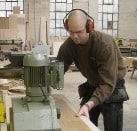Apprenticeships in England
Apply for apprenticeships in England
Wood machinists cut and prepare wood for construction projects. They may produce timber for panelling, floorboards, kitchen counters, bars, banisters, skirting boards, window and door frames, and more. As a wood machinist, you would require a good understanding of different types of timber and their uses, and the ability to use a range of hand tools and machinery.
£17000
-£35000
41-43
There are several routes to becoming a wood machinist. You could complete a college course, an apprenticeship or apply directly to an employer for work.
You should explore these routes to becoming a wood machinist, to find out which is the right one for you. Although some of these options have certain qualification requirements, many employers are more interested in people who are enthusiastic, willing to learn and can follow instructions.
You may need a Construction Skills Certification Scheme (CSCS) card to work on a construction site.
You could complete a college course to help you become a wood machinist.
Find out what the entry requirements are where you live.
An apprenticeship with a construction company is a good way into the industry.
You could complete an intermediate apprenticeship as a wood product manufacturing operative, or an advanced apprenticeship in wood machining.
Apprenticeships are open to anyone over the age of 16. As an apprentice, you’ll be fully employed by your company and expected to work a minimum of 30 hours a week. Your time will be split between on-the-job experience and a college or training provider.
Find out what the entry requirements are where you live.
If you have some previous experience in carpentry or joinery, you could apply directly to an employer to become a wood machinist. You could begin your career as an assistant or trainee. As you become more experienced, your employer might offer training to help you progress in the role.
Work experience is essential to gaining employment within the construction industry. You could gain this at school, or by working weekends and holidays with a company or relative who works as a wood machinist. Potential employers will always be pleased to see work experience listed on your CV.
Desirable skills for a wood machinist include:
To become a Wood Machinist, you could complete a:
To become a Wood Machinist, you could complete a:
To become a Wood Machinist, you could complete a:
Depending on the project, the responsibilities of a wood machinist vary daily.
The typical duties of a wood machinist include:

Robert Hainsworth
"I really enjoy the variety of my work, no day is the same."
The expected salary for a wood machinist varies as you become more experienced.
Hours and salary depend on location, employer and any overtime you may do.
* Salaries have been collected from multiple industry sources
Check out the latest wood machinist vacancies:
As these are external websites, the number of vacancies related to your preferred role may vary. New opportunities will be posted as they come up.
As a wood machinist, you could move into a related role such as carpentry, joinery or you could become a shopfitter, kitchen or bathroom fitter. Alternatively, you could adapt your skills to become a CAD operative.
With experience, you could progress into a more senior role as a supervisor, team leader or manager.